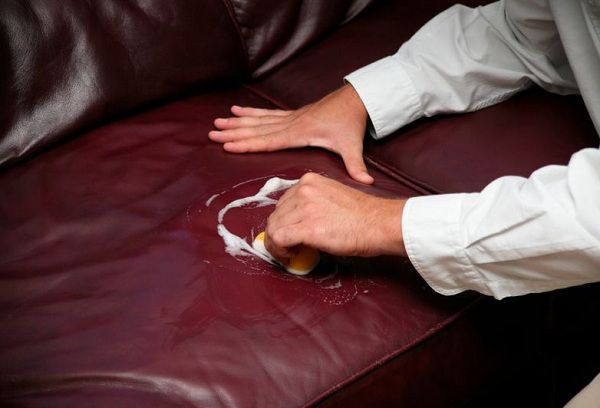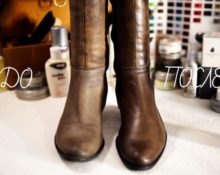With the meticulousness of a perfectionist, we wash ourselves every day, clean our shoes until they shine, and put our wardrobe in perfect order. But we often forget that accessories in the form of glasses also require careful care and handling. Regardless of what role they play in our lives - protection or correction. Read on to find out what needs to be done in order to extend their operation time and not harm your health.
The main laws of eyeglass care
Clarity of vision is due to the cleanliness and absence of mechanical damage on the lenses. And for this, it is necessary to observe three principles: proper storage, careful handling and daily care.
How and where to store?
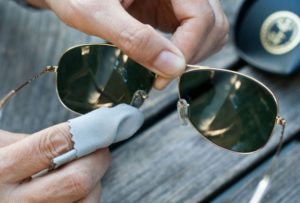 Following storage rules increases the service life of the optics. Taking off my glasses be sure to place them in a hard case, equipped with a soft lining inside, which also needs to be periodically cleaned of dust and crumbs. The cover must fit in size and close easily without the use of force.But something too voluminous is also not suitable, so that its contents do not shift or turn over when moving or vibrating.
Following storage rules increases the service life of the optics. Taking off my glasses be sure to place them in a hard case, equipped with a soft lining inside, which also needs to be periodically cleaned of dust and crumbs. The cover must fit in size and close easily without the use of force.But something too voluminous is also not suitable, so that its contents do not shift or turn over when moving or vibrating.
Important! Do not leave glasses in places with high humidity, such as the bathroom or kitchen. Various aggressive cleaning and cleaning substances, oil splashes, deodorants, perfumes, hairspray, can destroy the structure of special glass coatings.
How to wear?
We often see a picture where young people wear glasses as a headband. Not only is this unsightly, but it also causes irreparable harm to the shape of the frame, disrupting its symmetry and deforming the temples. In addition, there is a risk that they will slip and fall to the floor.
When your eyes are tired or you want to take off your sunglasses indoors, just use additional accessories in the form of a chain or cord. They will not let you forget your accessory in an unfamiliar place, and it will always be with you.
What and how to clean?
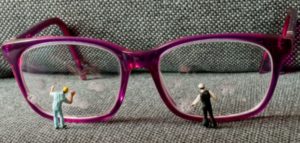 To maintain aesthetics, it is necessary to clean not only the lenses, but also the frame itself. Prepared at home Glasses for any purpose are washed in warm water with the addition of liquid dish soap, shampoo, shower gel or laundry soap. You can go over the joints of the parts with a cotton swab. Then rinse with clean running water and dry with a clean towel or soft cloth.
To maintain aesthetics, it is necessary to clean not only the lenses, but also the frame itself. Prepared at home Glasses for any purpose are washed in warm water with the addition of liquid dish soap, shampoo, shower gel or laundry soap. You can go over the joints of the parts with a cotton swab. Then rinse with clean running water and dry with a clean towel or soft cloth.
If the frame consists of precious metals or is coated with them, it must be processed in professional ultrasonic baths.
Lens Care Basics
You cannot use clothes, disposable towels, toilet paper and ordinary rags because they have a rough texture. Special products that can be purchased at optical stores are suitable for this:
 disposable wet wipes - have antibacterial properties, as they consist of soft fiber impregnated with an alcohol solution. Remove dirt from even the smallest pores on lens surfaces;
disposable wet wipes - have antibacterial properties, as they consist of soft fiber impregnated with an alcohol solution. Remove dirt from even the smallest pores on lens surfaces;- sprays and liquids - remove not only dirt, but also traces of grease. They impart antistatic qualities, as a result of which dust particles do not settle on the glass plane;
- anti-fogging agent – on a rainy or frosty day with a sudden change in temperature, it will prevent the appearance of condensation on the accessory;
- reusable microfiber cloths - effectively remove all types of dirt without leaving streaks. In turn, they also need to be cared for by hand washing with laundry soap. When processing glasses, you should hold the crossbar between the frames with two fingers.
Glass
These lenses are strong, durable and resistant to physical damage. Their main disadvantages are thickness and heavy weight, so they can only be used in a plastic frame. However, they are undemanding in terms of content. Wiping with a flannel cloth or cotton material is allowed.
Plastic
They are lighter, thinner and more comfortable, but soft in structure. As a result, they are more susceptible to mechanical stress, causing defects in the form of scratches, chips and stains. Therefore, they require a more delicate attitude towards themselves. Special polymer coatings do not allow abrasive or oil-soluble care products.
Which means can be used and which cannot?
 Both optics options will last much longer if you treat them according to all the rules. The choice of cleaning components plays an important role in this. It is undesirable to use acidic, alkaline, abrasive substances. They damage the specific layer and surface of the lenses. And this, in turn, affects their functionality.
Both optics options will last much longer if you treat them according to all the rules. The choice of cleaning components plays an important role in this. It is undesirable to use acidic, alkaline, abrasive substances. They damage the specific layer and surface of the lenses. And this, in turn, affects their functionality.
Visibility deteriorates, which leads to decreased visual acuity. The use of care systems sold in optical stores or neutral soap solutions are most suitable for these purposes.
What happens if you don't take care of your glasses?
Lack of adequate care can lead to premature failure of eyeglass optics and reduce their service life. This will also cause vision impairment and eye diseases caused by viruses and microorganisms.
How to extend the “life” of glasses?
Careful handling and careful maintenance are key to the longevity of your glasses. What you need to do for this:
 Do not use rough woven materials for cleaning as they can scratch the surface or coating. In the absence of special napkins Wipe with soft flannel or microfiber. Any self-respecting manufacturer, when making glasses, completes them with this part and a case;
Do not use rough woven materials for cleaning as they can scratch the surface or coating. In the absence of special napkins Wipe with soft flannel or microfiber. Any self-respecting manufacturer, when making glasses, completes them with this part and a case;- Under no circumstances should you store them on a shelf or in a closet with the lenses facing down, this will inevitably lead to defects, which is absolutely unacceptable. Even if you have several points, each of them keep in individual case;
- should be put on and taken off by holding both arms with your hands;
- Don't let other people try it on or wear it, it's a personalized accessory meant just for you;
- Do not leave it in direct sunlight for long periods of time, such as on a car dashboard or on the beach. Polymers do not tolerate prolonged exposure to high temperatures;
- wear the item only where it is supposed to, namely on the bridge of your nose.Young people now periodically place them not only on the parietal region of the head, but also on the back of the head. As a result, the screws become loose, the shape of the frame changes, the frames shift and the glass becomes skewed.
And finally, a few tips. Visit an ophthalmologist at least once a year, change your glasses every three years, and change your lenses annually. Do not use faulty or damaged optics to avoid injury to your face or eyes.



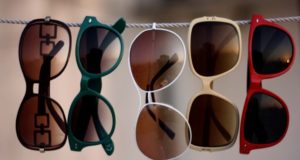
 1
1


